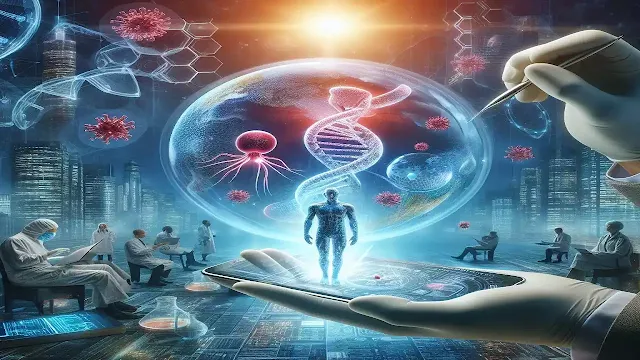Unveiling Tomorrow's Cures: A Look at Biomedical Technology and Biotechnology Innovations
Introduction
Biomedical technology and biotechnology are driving forces behind the evolution of healthcare. With groundbreaking discoveries in genetic engineering and revolutionary advancements in medical devices, these fields are continuously expanding the horizons of what can be achieved in healthcare delivery and improving patient outcomes. These innovations hold the promise of transforming the way diseases are treated, diagnoses are made, and healthcare is delivered, ushering in a new era of personalized and more effective medical care.

Biomedical Technology and Biotechnology Innovations
Revolutionizing Healthcare with Medical Engineering
Medical engineering, also referred to as biomedical engineering, encompasses a diverse range of technologies aimed at enhancing patient care and treatment outcomes. From prosthetics to medical imaging devices and wearable health monitors, medical engineering plays a vital role in improving the quality of life for individuals worldwide. Recent advancements in this field include:
- Advanced Prosthetics: Recent innovations in prosthetic limbs leverage advanced materials and embedded sensors to provide greater mobility and functionality for amputees, enhancing their overall quality of life.
- Diagnostic Imaging: State-of-the-art imaging technologies like MRI, CT scans, and ultrasound offer clinicians unprecedented insights into the human body. These tools enable earlier disease detection and more accurate diagnoses, leading to more effective treatment plans.
- Remote Patient Monitoring: Wearable devices equipped with biosensors enable healthcare providers to monitor patients' vital signs and health metrics in real-time, even from a distance. This capability facilitates proactive interventions and personalized care plans, improving patient outcomes and reducing healthcare costs.
Breaking New Ground in Genetic Engineering and Bioprocessing
Biotechnology, with a focus on genetic engineering and bioprocessing, is reshaping healthcare and disease treatment methodologies. Through genetic manipulation and advanced bioproduction techniques, researchers and biotech companies are forging new paths in medical intervention. Significant advancements in this domain encompass:
- Gene Editing Technologies: Innovations like CRISPR-Cas9 facilitate precise alterations to the human genome, presenting promising avenues for addressing genetic disorders and diseases with unprecedented accuracy.
- Biopharmaceutical Production: Breakthroughs in bioprocessing methods are revolutionizing the manufacturing of biologic drugs, including vaccines, monoclonal antibodies, and gene therapies. These advancements enhance the accessibility and affordability of life-saving treatments for a broader population.
- Regenerative Medicine: The advent of stem cell therapies and tissue engineering is heralding a new era of regenerative treatments. These approaches hold immense potential in repairing and replacing damaged tissues and organs, offering hope to patients afflicted with conditions ranging from spinal cord injuries to heart disease.
Pioneering Research in Molecular Biology and Synthetic Biology
At the forefront of biomedical innovation, molecular biology and synthetic biology are revolutionizing our understanding of living systems and our ability to manipulate them for specific purposes. Researchers in these fields are pushing the boundaries of what's achievable in healthcare and beyond, leading to remarkable advancements.
Precision Medicine: This field has seen significant progress, thanks to molecular diagnostics and genomic sequencing. These technologies allow for the development of personalized treatment approaches that cater to an individual's unique genetic makeup and disease profile. By analyzing genetic data, healthcare providers can tailor treatments to maximize effectiveness and minimize side effects, ushering in a new era of targeted therapies.
Synthetic Life Forms: Scientists are now engineering synthetic organisms with custom-designed genomes, opening up a myriad of possibilities. These synthetic life forms are not only utilized in biofuel production but also play a crucial role in drug discovery. By manipulating the genetic code, researchers can create organisms capable of producing valuable compounds for pharmaceutical purposes, paving the way for innovative therapeutic solutions.
Bioinformatics: The integration of computational tools and big data analytics has transformed biological research. This interdisciplinary field accelerates the analysis of complex biological systems, allowing researchers to uncover patterns and insights that were previously inaccessible. Bioinformatics also facilitates the discovery of novel drug targets and therapeutic interventions, offering promising avenues for addressing unmet medical needs.
Together, these recent breakthroughs in molecular and synthetic biology signify a paradigm shift in healthcare and scientific research. By harnessing the power of genetic manipulation, data analytics, and innovative technologies, researchers are driving transformative changes that have the potential to improve human health and well-being on a global scale.
Embracing the Future of Healthcare Technology
As we gaze into the future of healthcare, it's clear that innovation and collaboration are the driving forces behind transformative change. The latest breakthroughs in biomedical technology and biotechnology hold immense potential to revolutionize the way we approach health and wellness, promising a brighter, more equitable future for everyone.
AI-driven Diagnostics: Imagine a world where diseases are detected with pinpoint accuracy, thanks to the power of artificial intelligence. AI-driven diagnostic tools analyze medical data to provide early detection and personalized treatment recommendations, leading to better outcomes for patients worldwide.
3D-printed Organs: Picture a future where organ transplants are no longer constrained by the limitations of donor availability. With advancements in 3D printing technology, organs can be biofabricated to match the recipient's unique anatomy, reducing transplant waiting times and improving the success rates of life-saving procedures.
Telemedicine and Remote Monitoring: Envision a healthcare system where distance is no longer a barrier to quality care. Through telemedicine and remote monitoring, patients can connect with healthcare providers from anywhere, receiving timely consultations and proactive management of their health conditions without the need for in-person visits.
Precision Medicine and Personalized Therapies: Consider a treatment approach that's tailored to your individual genetic makeup and lifestyle factors. Precision medicine offers personalized therapies that target the specific molecular pathways driving disease, maximizing efficacy while minimizing side effects for a truly personalized approach to healthcare.
Enhanced Data Analytics and Predictive Modeling: Picture a healthcare ecosystem powered by data-driven insights and predictive analytics. By harnessing the vast amounts of healthcare data available, we can identify trends, predict outcomes, and optimize healthcare delivery to improve patient outcomes and streamline operations.
Navigating Ethical Considerations
While the latest innovations in biomedical technology and biotechnology hold immense promise, they also raise important ethical considerations that must be addressed. From concerns about data privacy and genetic discrimination to the equitable distribution of healthcare resources, navigating the ethical landscape of emerging technologies is essential to ensuring that their benefits are realized without exacerbating existing disparities. Key areas of focus include:
- Data Privacy and Security: As healthcare becomes increasingly digitized, ensuring the privacy and security of patients' medical data is paramount. Robust data protection measures and transparent data-sharing policies are needed to safeguard sensitive information and maintain patient trust.
- Genomic Privacy and Genetic Discrimination: The widespread adoption of genetic testing and genomic sequencing raises concerns about the misuse of genetic information for discriminatory purposes, such as denying employment or insurance coverage based on genetic predispositions. Legal protections and anti-discrimination policies are needed to prevent such abuses and uphold individuals' rights to genetic privacy.
- Access and Affordability: Despite the potential of biomedical innovations to improve healthcare outcomes, access to these technologies remains unevenly distributed, with marginalized communities often facing barriers to access and affordability. Efforts to promote health equity and reduce disparities in access to care are essential to ensuring that the benefits of innovation are realized by all members of society.
- Informed Consent and Autonomy: As new technologies such as gene editing and advanced biologics become increasingly available, ensuring that patients are fully informed about the risks and benefits of these interventions is crucial to upholding their autonomy and right to self-determination. Clear guidelines and standards for informed consent are needed to protect patients' rights and promote shared decision-making between patients and healthcare providers.
Collaborating for Impact
Addressing these complex ethical challenges requires a collaborative approach that engages stakeholders from across the healthcare ecosystem, including patients, clinicians, researchers, policymakers, and industry leaders. By fostering interdisciplinary dialogue and leveraging diverse perspectives, we can develop ethical frameworks and governance structures that promote the responsible development and deployment of biomedical technologies. Key strategies for collaboration include:
- Multi-stakeholder Partnerships: Bringing together diverse stakeholders to co-create solutions and establish common standards for ethical practice.
- Public Engagement and Education: Engaging the public in discussions about the ethical implications of biomedical innovations and empowering individuals to make informed decisions about their healthcare.
- Policy Advocacy and Regulation: Advocating for policies and regulations that balance the need for innovation with the imperative to protect individual rights and promote public health.
- Ethics Training and Professional Development: Providing healthcare professionals and researchers with training and resources to navigate ethical challenges and integrate ethical considerations into their practice.
Conclusion
The latest innovations in biomedical technology and biotechnology hold tremendous promise for transforming healthcare and improving patient outcomes. From precision medicine and regenerative therapies to AI-driven diagnostics and personalized healthcare solutions, the possibilities are vast. However, realizing this potential requires not only technical expertise but also a deep commitment to ethical practice and responsible innovation. By addressing ethical considerations head-on and fostering collaboration across disciplines, we can harness the power of biomedical innovation to create a healthier, more equitable world for all.
FAQs (Frequently Asked Questions)
What is AI-driven diagnostics, and how does it work?
- AI-driven diagnostics utilize artificial intelligence algorithms to analyze medical data such as imaging scans, lab results, and patient records. These algorithms can detect patterns and abnormalities that may not be readily apparent to human clinicians, enabling earlier detection and more accurate diagnosis of diseases.
How are 3D-printed organs created, and are they safe for transplantation?
- 3D-printed organs are created using bio-compatible materials and precise layering techniques to mimic the structure and function of natural organs. While research in this field is ongoing, early studies have shown promising results in terms of safety and efficacy. However, further research and clinical trials are needed to ensure the long-term safety and viability of 3D-printed organs for transplantation.
What are the benefits of telemedicine and remote monitoring?
- Telemedicine and remote monitoring offer numerous benefits, including increased access to healthcare services, reduced healthcare costs and travel expenses, enhanced convenience for patients, and proactive management of chronic conditions. These technologies also enable healthcare providers to reach underserved populations and deliver care remotely, improving overall health outcomes.
How does precision medicine vary from traditional approaches to healthcare?
- Precision medicine takes into account individual differences in genetics, environment, and lifestyle to tailor medical treatment and interventions to each patient's unique characteristics. This personalized approach allows for more targeted therapies, minimizing side effects and optimizing treatment outcomes compared to traditional one-size-fits-all approaches.
What role does data analytics play in shaping the future of healthcare?
- Data analytics enables healthcare organizations to leverage large volumes of healthcare data to identify trends, predict outcomes, and optimize healthcare delivery processes. By harnessing the power of big data and predictive analytics, healthcare providers can improve clinical outcomes, enhance patient safety, and streamline operations for better overall healthcare experiences.





